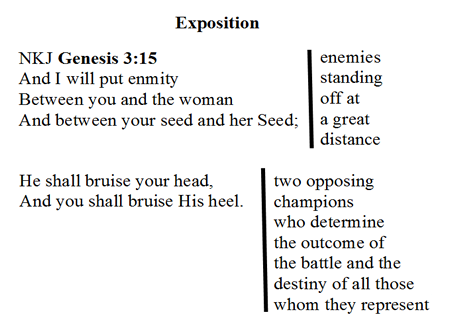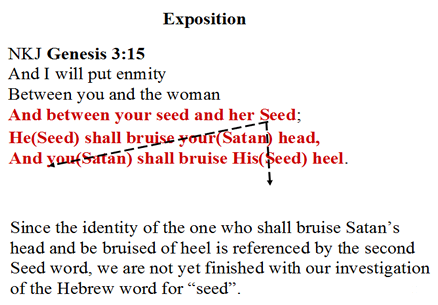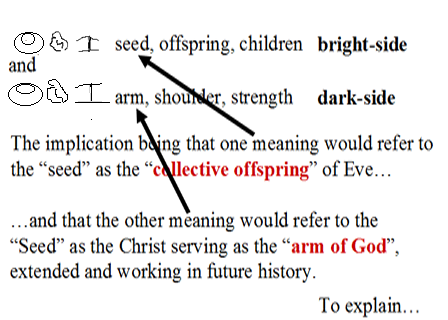The Friendly Fire Room Presents
Listen And See
Thank you Wanda Barlow for this great idea!
Genesis Framework Part 31
Genesis 3:15 part 3
To God be the Glory, great things He has done.
mcmtffr.org wishes to acknowledge and thank Derek Konofalski and Rocket Media for making this page:
Mobile Friendly
Genesis Framework Part
GF 31 Genesis 3.15 (Part 3)
April 10, 2016
Part 31
NKJ Genesis 3:15
And I will put enmity
Between you and the woman,
And between your seed and her Seed;
He shall bruise your head,
And you shall bruise His heel."
Last week we saw the David and Goliath battle imagery at work in this verse pointing us to the idea of two large opposing armies, enemies standing off with a far distance separating them one from the other.
The second idea is that of two opposing champions, where the outcome of the battle belongs to them, then the outcome is imputed to every single member of the respective armies of each champion.


I was pleasantly surprised to discover, just several weeks ago, that there are actually two meanings for the Hebrew word used here for “seed”. You may be thinking, ”So what?” Well, the discovery is significant because it offers a reasonable explanation for the grammatical ability of the word “seed” to have two figurative representations,
(1) as “seed” (collective singular) and
(2) “Seed” (individual singular), the idea that we have already discussed several times.
Remember in our previous discovery of that lost ancient
Hebrew pictographic letter ![]() ghah, we said that it had eventually become absorbed into the letter
ghah, we said that it had eventually become absorbed into the letter ![]() ayin at a
later time?
ayin at a
later time?
If we go to a standard Hebrew lexicon, we find two
meanings for the word for seed ![]() zeh’rahg.
zeh’rahg.
The two meanings for the word ![]() zeh’rahg
zeh’rahg ![]() ,
here translated as “seed” suggests the strong possibility
that originally there were two forms:
,
here translated as “seed” suggests the strong possibility
that originally there were two forms:
![]() , seed, offspring, children bright-side and
, seed, offspring, children bright-side and ![]() arm, shoulder, strength dark-side
arm, shoulder, strength dark-side
To make sense of the pictographics -

![]() , seed, offspring, children bright-side
, seed, offspring, children bright-side
Action: to sow verb
Concrete: seed noun
Lit. The sowing of seeds by scattering them across the field.
 seed, offspring, children bright-side
seed, offspring, children bright-side
From the root- 

(After the grain has been harvested and the heads of grain have been struck to be broken open, the heads are thrown into the wind where the chaff is blown away and the seed collects to be gathered.)
 arm, shoulder, strength dark-side
arm, shoulder, strength dark-side
Concrete: arm
Abstract: force, as in the strength of the arm, stressing the spreading ability of the arm From the same root- 
How can the word be considered as having dark-side sense in its meaning?
It will apparently be in the sense of a dark-side for Satan; since it will be this Seed which will, with a mortal strike to his head, defeat and destroy him, effectively harvesting the wheat from the chaff, separating him from influence, leadership, strength, acquired lordship, etc..
It appears that one meaning of seed, by implication, refers to the “seed” as the “collective offspring” of Eve, while the primary meaning of seed refers to the “Seed”, who is the Christ, functioning as the “strong arm of God” extended, working in future history.
The primary meaning “arm” denotes the sense of the strength of the arm that scatters seed upon the field.
It also points to the spreading ability of the arm, as representing power; as such it means a political or military force; literally, of a man (singular) as Yahweh’s arm as an instrument of deliverance and judgment.
In the sense of salvific history, the “Seed” is a Man who functions as Yahweh’s “arm”, as an instrument of divine deliverance and judgment. So, the meaning obviously is a description of the Champion of all of God’s children, Christ Jesus Himself, who came once to conquer and deliver (strike the head), and will come again and to render final judgment (to separate forever).
The enemy of Israel in Jesus’ day of ministry was not primarily Rome, but sin, death, Satan, and his power as an influence over men to do evil.
Although the word champion![]() (ghib-bore') does not
explicitly appear in our text in Genesis, the implication
of it’s meaning is very evident.
(ghib-bore') does not
explicitly appear in our text in Genesis, the implication
of it’s meaning is very evident.
He(Seed) shall bruise your(Satan) head, And you(Satan) shall bruise His(Seed) heel.
![]() shoof to bruise, to strike, to break as in a striking of a serpent
shoof to bruise, to strike, to break as in a striking of a serpent
From the root  Lit. “sharp teeth in mouth”
Lit. “sharp teeth in mouth”
Action: to strike
Concrete: a serpent
He(Seed) shall bruise your(Satan) head, And you(Satan) shall bruise His(Seed) heel.

![]() 'a-qeyb‘ the heel, rear, footprint, hinder part,
rear of a troop
'a-qeyb‘ the heel, rear, footprint, hinder part,
rear of a troop 
Action: to restrain as the restraining of the heel when taking a step forward
Concrete: a heel as what is restrained when taking a step forward
KJV translates this word variously as supplant, heel, stay
![]() 'a-qeyb‘ the heel, rear, footprint, hinder part,
rear of a troop
'a-qeyb‘ the heel, rear, footprint, hinder part,
rear of a troop 
NKJ Genesis 25:26a
Afterward his brother came out, and his hand took hold
of Esau's heel; so his name was called Jacob.
![]() 'a-qeyb‘ the heel, rear, footprint, hinder part,
rear of a troop
'a-qeyb‘ the heel, rear, footprint, hinder part,
rear of a troop 
NKJ Genesis 27:36 ![]()
![]()
And Esau said, "Is he not rightly named Jacob?
For he has supplanted me these two times.
He took away my birthright, and now look,
he has taken away my blessing!" And he said, "Have you not reserved a blessing for me?"
Does this mean, “God restraining”?
The word also refers to the heel, of man, as an object of
attack from behind; as an instrument of attack; and
figuratively, in the sense of taking some cruel advantage
of someone, as in a gross betrayal, and as an enemy who
marks another’s footprints, i.e. to watch him insidiously
wherever he goes.
While this compound idea of tracking from behind, watch insidiously wherever one goes, and to look for ways to take some cruel advantage of someone, does not apply to the historical type portrayed in the David and Goliath event, it certainly does fit later to the events in Jesus life.
Recall in the Scriptures the many instances where the priests and Pharisees were constantly nearby, following Him around, taking account of Jesus’ every word and action, hurling insults and accusations at Him, feeding reports to the Sanhedrin, secretly hatching plots to kill Him; the Judas’ betrayal; Peter’s denial; Israel’s cruelty; and Rome’s violence.
NKJ 1 Samuel 17:49-50
Then David put his hand in his bag and took out a stone;
and he slung it and struck the Philistine in his forehead,
so that the stone sank into his forehead, and he fell on
his face to the earth. So David prevailed over the
Philistine with a sling and a stone, and struck the
Philistine and killed him. But there was no sword in the
hand of David.
In the historical account of the battle between David and Goliath, the English word “champion” is used three times to describe the function of Goliath in behalf of the Philistines.
The last of the three times…
NKJ 1 Samuel 17:51b
And when the Philistines saw that their champion was dead, they fled. …the Hebrew is ![]() gib-bor’ mighty one.
gib-bor’ mighty one.
In the other two previous instances...
NKJ 1 Samuel 17:4
And a champion went out from the camp of the
Philistines, named Goliath, from Gath, whose height
was six cubits and a span.
NKJ 1 Samuel 17:23
Then as he talked with them, there was the champion,
the Philistine of Gath, Goliath by name, coming up from
the armies of the Philistines; …the Hebrew is an idiomatic expression.
![]() lit. a man of the interval between, mediator
lit. a man of the interval between, mediator
In the sense of salvific history, “the Man as Yahweh’s arm as an instrument of deliverance and judgment,” the meaning obviously is a description of the Champion (El-ghib-bore') of God’s children as Christ Jesus Himself, who came once as Mighty-Hero to save (bright-side), and will come again as Man-of-the-Interval to judge (dark-side).
NKJ Isaiah 9:6
For unto us a Child is born,
Unto us a Son is given;
And the government will be upon His shoulder.
And His name will be called Wonderful,
Counselor, Mighty God, Everlasting Father,
Prince of Peace.
![]() El Gibbor
El Gibbor
Christ Jesus is our Champion, our Mighty God, our Man-of-the-interval, our Mediator; and the outcome of
the battle He won against the champion of darkness by
having mortally struck his head, is imputed to every
single member of the respective armies of each champion,
forever and ever.
Many will be surprised on the Day of Judgment when they discover that it was just as the Word of God says; only the righteousness of Christ is able to save you.All men are sinners and no one can save himself. God is just, so He must punish sin; but He is also merciful, moreover gracious, and offers His Son as the perfect sacrifice in order to purchase a place for you in heaven, which He offers to you as the free gift of eternal life. As we continue to examine man’s earliest duties with regard to the covenant of works, although they can be categorically divided into two distinct types of classes; one in relationship with God, and the other in relationship with fellow man, all covenant stipulations are expressions of the will of the Lord. The law of the covenant is the law of man’s image-sonship.
Jesus is God Incarnate
In order to pay the debt of our sins, He came from Heaven, having been sent by the Father, where He lived a life of perfect obedience to the Father even unto the shameful death upon the cross in order to pay the debt of your sins.This gift must be received by faith, believing that Jesus’ perfect life and Cross Work was His complete and necessary Atonement for your sins, in your behalf.Faith is a gift that comes by the Power of God the Holy Spirit working in a person’s innermost being. The Holy Spirit has the authority and power to quicken your dead spirit, to make it come to life. If you have not done so before this moment, ask Jesus to forgive you your sins, tell Him you’ve stop trying to be your own savior, and ask Him to come into your life right now, and to give you eternal life. Then, in faith believing, thank Him for the gift that He is giving you, the one He paid for in full in your place, in Jesus’ name, AMEN
Copyright April, 2016
Rev. Jim Craig
All Rights Reserve